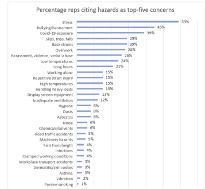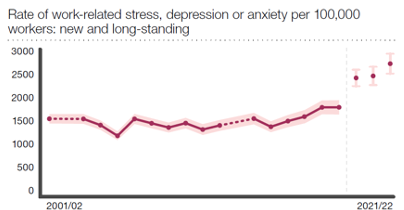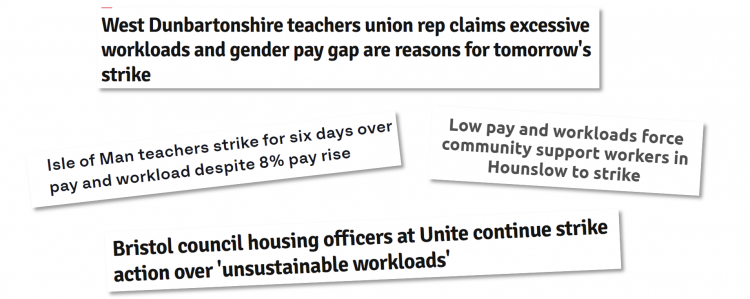Work intensification
Overwork is consistently identified as one of the most common health and safety hazards by union accredited safety representatives. In the TUC’s 2021 survey, 35 per cent of safety reps identified it as a problem in their workplace. In our 2023 survey, 42 per cent identified overwork as a top concern, with 34 per cent per cent also citing long hours. Stress is consistently the most commonly cited workplace hazard, with workload, work intensity and working hours generally understood to be major contributing factors to work-related stress.
In the seventeen years that the TUC has conducted this survey, there has been a general trend: a fall in the occurrence of physical hazards, for example falls from height or exposure to toxic chemicals, replaced by a rise in the risk of psychological and behavioural hazards.
Stress, overwork, and long hours reported as a common hazard by union safety reps:
|
Hazard |
2023 |
2021 |
2018 |
2016 |
2014 |
|
Stress |
73 per cent |
70 per cent |
69 per cent |
70 per cent |
67 per cent |
|
Overwork |
42 per cent |
35 per cent |
36 per cent |
40 per cent |
36 per cent |
|
Long hours |
34 per cent |
29 per cent |
29 per cent |
30 per cent |
26 per cent |
Data from TUC Safety Reps Surveys (2014 – 2023)
Overwork, stress and long hours are all more likely to be reported in the voluntary sector, education, health and central government.
According to the Health and Safety Executive (HSE), Britain’s primary workplace safety regulator, cases of work-related stress are rising.
HSE Annual Statistics 2022
Health and safety risks
A range of health effects are associated with intensive working practises, with long hours known to be a major cause of fatigue.
When workers are tired, or under excessive pressure, they are also more likely to suffer injury, or be involved in an accident – 20 per cent of all serious accidents are a result of fatigue.
Long term-ill health conditions caused by overwork include hypertension and cardiovascular disease, digestive problems, and long-term effects on the immune system, increasing risk of causing autoimmune disease diagnoses. It can even result in death: one study found 745,000 people worldwide die as a result of working long hours. In 2022, a courier tragically died in the run-up to Black Friday after working 14-hour shifts. 47 In 2006, an employer became the first to be prosecuted for such a death, after a driver died after working 76 hours over four days.48
Other forms of work intensification, e.g. targets and fast-paced working can cause other hazards. Reports of Amazon workers being forced to urinate in bottles during shifts 49 as a result of excessive pressure to complete tasks, and lack of breaks means workers can risk developing urinary tract infections and make the workplace unhygienic.
In addition to work-related ill health and injury, an alarming number of suicides are linked to work. Hazards Campaign estimates that there are 650 work-related suicides in Britain every year and that 10 per cent of suicides are work-related.50 The most common causes of work-related suicides are job insecurity, overwork and stress.
Work-related suicide is not recorded or investigated by the HSE. After a suicide occurs, employers are not required to evaluate workplace hazards or modify policies and practices. There is no official workplace investigation conducted following an employee's suicide or suicides. A 2021 report by Professor Sarah Waters and Hilda Palmer recommended suicide be included in the list of work-related deaths that must be reported to the regulator for investigation, and for explicit and enforceable legal requirements that oblige employers to take responsibility for suicide prevention.51
There has been recent attention to work-related suicide following the tragic death of headteacher Ruth Perry. The family of Perry have identified pressure relating to Ofsted inspections as a major causal factor in her suicide, and unions and researchers have suggested the problem is more widespread. Walters and Palmer’s (2021) study found that since 1998, coroners’ inquests into the suicides of at least 10 teachers have heard that they took their own life before or after an Ofsted inspection [insert reference].
The role of union organising
All employers have a duty to manage risk, including risk of adverse effects from overwork. Where an employer recognises a trade union, the union may appoint health and safety representatives who have a legal right to monitor, investigate and inspect working practises for risks and hazards.
Among the legal rights set out under the Safety Reps and Safety Committees Regulations 1977, safety reps have the right to:
- be consulted on risk assessments.
- carry out inspections (this could include inspecting workloads or shift patterns)
- issue Union Improvement Notices
- establish (and attend) safety committees
- see relevant information, for example inspection reports or the accident book.
Several unions have taken collective, industrial action in response to punishing workloads, long hours and excessive pressure to complete tasks. These include the first strike by GMB members at an Amazon distribution centre in Britain: while the primary demand related to pay, the workers also walked out because of the long hours expected of them.52
Members of the RMT union on the Caledonian sleeper service took action over fatigue that was risking their safety and the safety of passengers.
After 29 per cent of Unite’s London bus drivers said they had fallen asleep at the wheel, they balloted in their tens of thousands for strike action over fatigue.52 There have similarly been strikes or threats of strike on a range of airlines, predominantly by pilot unions.
Other groups of workers including teachers and paramedics have also cited overwork as a primary concern in strike action.
- 47 Dixon, R; Odeen-Isbister, S. (24 November 2022). “DPD courier found dead after 'working 14-hour shifts 7 days a week' before Black Friday”. The Mirror.
- 48 6 July 2006). “Company fined after driver died at wheel”. Fleet News website.
- 49 Drury, C. (19 July 2019). “Amazon workers ‘forced to urinate in plastic bottles because they cannot go to toilet on shift”. Independent.
- 50 Waters, S. (28 October 2021). “Work-related suicides: the UK’s invisible crisis”. Red Pepper
- 51 Waters & Palmer ‘Work-related suicide: a qualitative analysis of recent cases with recommendations for reform’ (University of Leeds, 2021)
- 52 a b Street, P. “Breaking new ground – the battle for decent pay at Amazon”. Morning Star.
Stay Updated
Want to hear about our latest news and blogs?
Sign up now to get it straight to your inbox




